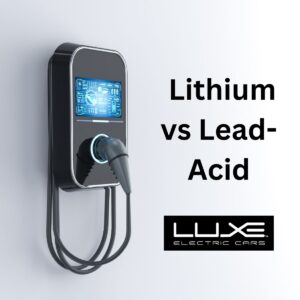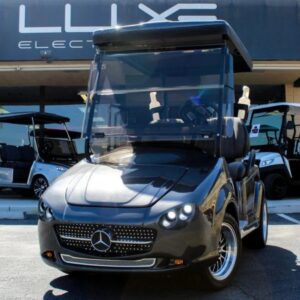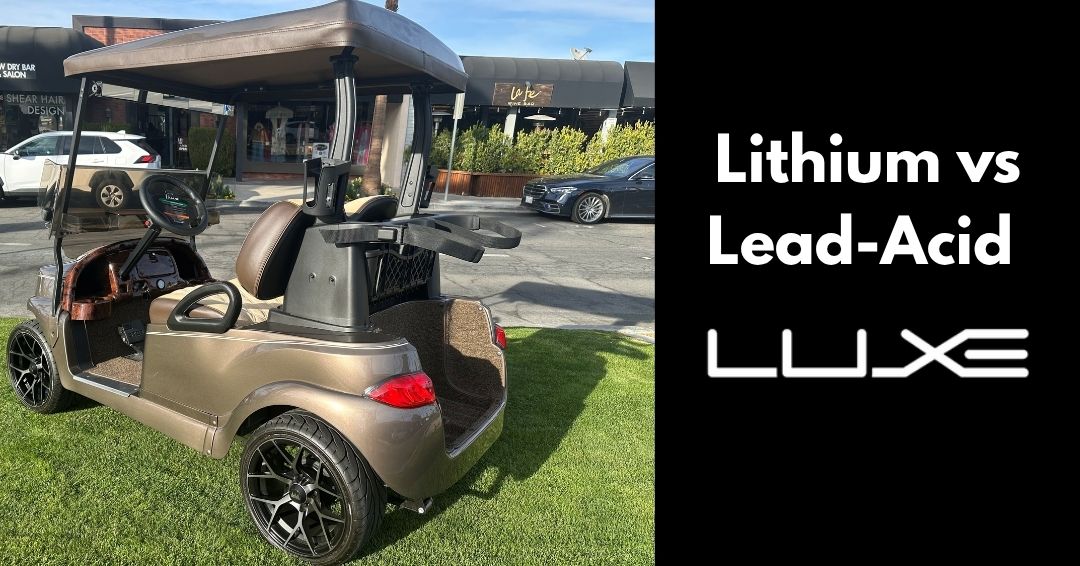When it comes to luxury electric golf carts, few components influence performance, convenience, and long-term value as much as the golf cart batteries. Whether you’re cruising through Palm Desert neighborhoods or enjoying the warm California winter, choosing the right golf cart battery makes all the difference.
This comprehensive guide explores the key differences between lithium and lead-acid batteries, helping you make an informed decision that aligns with your lifestyle, expectations, and investment in premium electric transportation.
Read more: How to Make Your Golf Cart Street Legal: A Complete Guide
Why Battery Choice Matters
Your battery is more than just a power source—it’s the heart of your electric golf cart. It determines how far you can travel, how often you need to charge, how much maintenance you’ll perform, and even how smoothly your cart accelerates or handles inclines. For high-end buyers who expect seamless luxury and dependable performance, selecting the right battery isn’t just a detail—it’s essential.
Read more: How Much Does It Cost to Replace My Golf Cart Batteries
Overview of Golf Cart Battery Types
Lead-Acid Batteries
Lead-acid batteries have been used in electric golf carts for decades. Known for their affordability and availability, these batteries rely on a combination of lead plates and sulfuric acid to generate energy. Most traditional electric carts have relied on these for years.
Key Features:
- Lower upfront cost
- Available in various voltages (6V, 8V, 12V)
- Require regular maintenance (water levels, corrosion checks)
- Heavier than lithium options
Lithium Batteries
 Lithium golf cart batteries, especially lithium iron phosphate (LiFePO4), represent the modern standard in premium electric vehicles. They offer better performance, significantly longer life, and less hassle than their lead-acid counterparts.
Lithium golf cart batteries, especially lithium iron phosphate (LiFePO4), represent the modern standard in premium electric vehicles. They offer better performance, significantly longer life, and less hassle than their lead-acid counterparts.
Key Features:
- Lightweight and compact
- Rapid charging and consistent voltage
- Maintenance-free
- Longer lifespan and better energy efficiency
Read more: Golf Cart Range: How Far Can Your Electric Cart Go on a Single Charge?
Performance Comparison: Lithium vs Lead-Acid
Energy Efficiency
Lithium: Up to 98% efficient, meaning nearly all stored power gets used.
Lead-Acid: Roughly 80–85% efficient. A portion of the stored energy is lost due to internal resistance and voltage drop.
👉 Verdict: Lithium batteries are more energy-efficient, which directly translates to longer ranges per charge and less power wasted.
Range
Lithium: Offers a longer range per charge—typically between 25 to 35 miles, depending on the cart model, terrain, and payload.
Lead-Acid: Generally offers a shorter range—around 15 to 25 miles—before needing a recharge.
👉 Verdict: If you want peace of mind on longer rides or prefer not to recharge often, lithium is the superior option.
Read more: How Often Should I Add Water to Golf Cart Batteries?
Weight and Handling
Lithium: Up to 70% lighter than comparable lead-acid batteries. The reduced weight leads to smoother handling, faster acceleration, and less wear on tires and suspension systems.
Lead-Acid: Much heavier, often requiring reinforced frames and suspension.
👉 Verdict: A lighter cart feels more agile and luxurious. Lithium’s weight advantage improves comfort and efficiency.
Charging Time
Lithium: Charges 2–3 times faster than lead-acid. Some models fully charge in 2–4 hours.
Lead-Acid: Can take 8–10 hours to fully charge, depending on the condition of the battery and the charger used.
👉 Verdict: If convenience matters, lithium wins hands down.
Read more: Golf Cart Registration in California: Costs, Requirements, and Tips | LUXE
Maintenance Requirements
Lithium Golf Cart Batteries
- Zero maintenance: No water levels to check. No acid corrosion. No cleaning.
- Built-in battery management systems (BMS): Prevent overcharging, overheating, and ensure battery health.
Lead-Acid Golf Cart Batteries
- Frequent upkeep required:
- Distilled water must be added routinely.
- Terminals must be cleaned and monitored for corrosion.
- Overcharging can reduce lifespan or cause battery swelling.
👉 Verdict: Lithium batteries remove the hassle entirely, perfect for owners who value simplicity and reliability.
Read more: Should I Leave My Golf Cart Plugged in All the Time?
Lifespan and Warranty
Lithium
- Lifespan: 8–10 years or more (up to 3,000 charging cycles)
- Warranty: Typically 5–8 years from premium suppliers
Lead-Acid
- Lifespan: 2–5 years (500–1,000 cycles), depending on care and usage
- Warranty: Usually 1–3 years
👉 Verdict: Lithium batteries outlast lead-acid by years, reducing total ownership costs over time.
Cost Breakdown
| Factor | Lithium | Lead-Acid |
| Upfront Cost | $$$ | $ |
| Maintenance Cost | $0 (maintenance-free) | $$ (tools, distilled water, labor) |
| Replacement Frequency | 1 per 8–10 years | 2–3 replacements in same period |
| Total Ownership Cost Over 10 Years | Often less due to fewer replacements and less downtime | Often more due to replacements and service |
While lithium batteries come with a higher upfront price, they pay for themselves over time through lower maintenance, longer lifespan, and fewer replacements.
Safety and Technology
Lithium batteries used in golf carts (especially LiFePO4 types) include advanced safety features such as:
- Overcharge protection
- Thermal regulation
- Automatic balancing
- Fire-resistant chemistry
Lead-acid batteries, on the other hand, can spill or emit harmful gases if improperly maintained, overcharged, or damaged.
👉 Verdict: Lithium’s safety systems make it a smarter choice for modern, eco-conscious users who prioritize family safety and long-term reliability.
Environmental Considerations
Golf cart owners in California—particularly in luxury communities—are increasingly concerned about sustainability.
Lithium batteries:
- Require fewer raw materials per lifetime mile
- Are recyclable
- Have no harmful acid
- Operate cleanly and efficiently
Lead-acid batteries:
- Contain hazardous materials
- Require more frequent replacement
- Are heavier and less efficient
👉 Verdict: For eco-conscious communities and property owners, lithium batteries are the environmentally responsible option.
Why Palm Desert Cart Owners Are Switching to Lithium
 Luxury lifestyle residents across Southern California are making the switch to lithium batteries for the same reasons they choose custom, high-performance carts: convenience, sophistication, and long-term value. With year-round sun and extensive gated communities, Palm Desert and surrounding areas are ideal environments for the benefits lithium offers—especially for homeowners who expect the best from their vehicles.
Luxury lifestyle residents across Southern California are making the switch to lithium batteries for the same reasons they choose custom, high-performance carts: convenience, sophistication, and long-term value. With year-round sun and extensive gated communities, Palm Desert and surrounding areas are ideal environments for the benefits lithium offers—especially for homeowners who expect the best from their vehicles.
LUXE Insight: Custom Builds Deserve Premium Power
At LUXE, we craft custom electric golf carts for discerning clients who expect more than average performance. Our premium builds are designed to integrate seamlessly with lithium technology—both in terms of power and aesthetic. From sleek dashboards with digital battery gauges to lightweight frames that glide effortlessly, your LUXE cart is engineered to make the most of your battery choice.
FAQ: Golf Cart Batteries
How long does a lithium battery last in a golf cart?
Most lithium batteries last 8 to 10 years, or around 3,000 charge cycles. With proper use, they can last even longer—providing reliable, long-term power with minimal degradation over time.
Are lithium batteries safe for golf carts?
Yes. Lithium iron phosphate (LiFePO4) batteries are among the safest available. They don’t leak acid, overheat, or catch fire under normal conditions. Advanced battery management systems monitor performance and temperature to ensure safe operation.
Can I upgrade my current golf cart from lead-acid to lithium?
Absolutely. Many carts can be retrofitted with lithium batteries. LUXE offers upgrade consultations and professional installation to make sure your cart is ready for a seamless transition.
What are the signs my golf cart battery needs replacing?
Reduced range, sluggish acceleration, extended charging time, or a noticeable drop in performance are all indicators that your battery may be near the end of its life. If you’re unsure, our team can assess your battery health.
Do lithium batteries work well in extreme temperatures?
Lithium batteries perform well in a wide range of climates. However, charging should be avoided in freezing conditions. If you plan to store your cart seasonally, LUXE can recommend battery care strategies for year-round protection.
Final Thoughts: Which Battery Is Best for You?
If you value performance, longevity, lower maintenance, and cutting-edge technology, lithium batteries are the clear winner for today’s electric golf cart owner. They align perfectly with a luxury lifestyle, offer better long-term value, and complement the superior craftsmanship of custom carts like those from LUXE.
Lead-acid still holds appeal for budget-focused buyers, but as the market shifts toward eco-friendly, high-performance vehicles, lithium is becoming the standard—especially in regions like Southern California.
Ready to Upgrade or Build Your Dream Cart?
Let our experts at LUXE help you select the perfect battery for your custom build or upgrade your existing cart to premium lithium power.
📍 Visit us in La Quinta or Palm Desert
🌐 Explore your options at luxeelectriccar.com
📞 Have questions? We’re just a call away.




